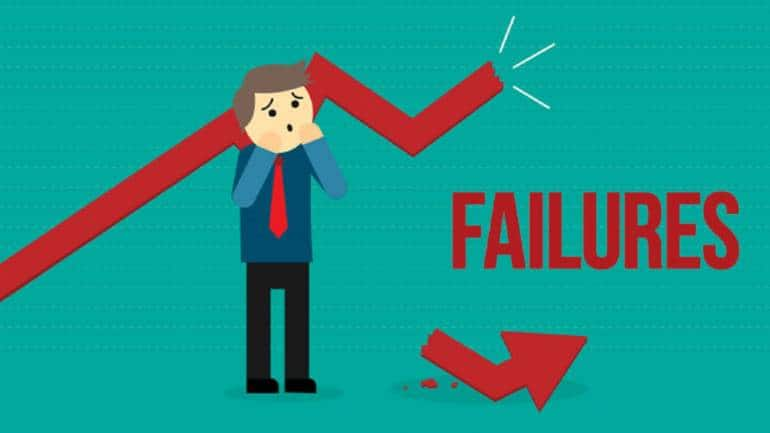



Entrepreneurs should be emotionally prepared to shut down their startup with dignity if the need arises, instead of waiting for a miracle or facing the legal wrath of vendors, advises K Vaitheeswaran, founder of one of the country's first e-commerce startups Indiaplaza.
Vaitheeswaran who is also referred to as the father of the Indian e-commerce has written a book called Failing to Succeed, enumerating his startup journey. The Bangalore-based entrepreneur had to face an unceremonious exit from Indiaplaza following the 'lack of investor support'.
So much so that he and his family was verbally abused with even death threats by many people who had their payments due, he writes in the book.
Indiaplaza started off in 1999 as Fabmart. It had a first mover advantage in e-commerce in India much ahead of Flipkart and Amazon in the game. The startup eventually shut down in 2013.
Over 14 years after the shutdown, Vaitheeswaran who currently does consulting work for companies has chronicled his journey in the book.
In an exclusive interaction with Moneycontrol, he shares his key learnings from his own journey that can help prepare young entrepreneurs for a touch battle -- setting up and successfully running a business in India.

1.Do plan your emergency exit route
The fact of the matter is that 99 percent of the startups will not get the financial outcomes that they want.
The planning, the ability, the thinking to be able to shut down properly, legally in a dignified manner and move on with your life is something that startups must keep in mind.
It is not that entrepreneurs should start a company thinking they will close it down.
That is not the point. 100 percent of startups should aim to be the one percent that succeeds but this is an important area that people need to keep in mind.
Things are bound to go wrong. Most startups will struggle to end properly, they should be able to legally and properly close down in a more dignified manner.

2.Focus on customers, not on investors
I don't think much time is spent on customers by startups and a lot of which is to do with easy money. I think the tendency of startups is that, if I have a problem, I will raise funding.
If I am not getting enough customers, let me raise funds. If the product is not working well let me raise funds. I am not able to hire good people, let me raise funds.
Sometimes startups list five problems and think 4.5 of them will get solved by getting more funding.
That's not the thing. I think, a lot of the problems will be solved by talking to customers enough. I am not sure that is being done in the current scenario.
3. Investors can be friends or your foes...
People keep saying that the relationship between an entrepreneur and an investor is like a honeymoon and a marriage and all of that.
The fact of the matter is that these are relationships with people where overall balance of power is not the same. And I am not saying that the investor is more powerful or the entrepreneur is more powerful. It is just that they bring completely different things to the table.
Many entrepreneurs keep saying that they are trying to raise money from an investor who will give them money and also add value to the company.
The fact is that there are very few investors like that. If the investor can add value to your business and give you the money, they don't need you, they will do the business themselves.
In most relationships, the entrepreneurs bring knowledge, passion, domain expertise and the idea and the investor brings in the money.
It is expected that the combination of the capital and the work will create a successful enterprise.
4. Read the same book to save a sinking ship...
When things go wrong, the return expectations of a founder and an investor become very different.
What I want investors and founders to do is to start reading from the same page. I don't care what book it is. It could be "sell the company", "raise more funds", "slow down the operations", "don't worry let's go crazy, we will figure out a solution but let's continue to be aggressive in the market".
5. Don't lose control of your own ship
One of the big mistakes that I made was to put myself in a position where my overall skin in the game, the percentage that I held was less than significant.
If an entrepreneur does that, then his or her ability to actually influence any future course of action in his or her own company virtually becomes negligible.
(Also Read: Snapdeal stakeholders divided over Kunal Bahl's decision to walk away from Flipkart merger)
If the founders between themselves have a reasonable say and control then the ability to bring people to talk from the same page or at least the same book gets easier.
In my case, I din't have the ability since my stake was very low.
Out of the five board seats, four seats were held by the investors. Indiaplaza's investors held 87 percent of the company.
They had the veto powers. There was nothing that I could do so it didn't matter what I was thinking. If the investors wanted to do something that would be done. If they didn't want to do something nothing could be done.
So make sure that the founders have enough skin and equity in the game to be able to control the decisions.

6.Have an emotional support
I don't even want my worst enemy to go through what I went through. It was almost impossible to survive.
When I finished writing the book, my wife read the first manuscript and she broke down. It's not that she didn't know what had happened. She was living the whole thing and yet after reading this she broke down. It was heartbreaking for us.
So I don't want anybody to go through it.
7. Measure failure in terms of time, keep an eye on the clock
For the 20-something generation that is currently governing the startup ecosystem, it is very important to ensure that at the end of every month find out how much money do you have and how many months will it survive.
It is like in peak traffic time in Mumbai, Delhi and Bangalore, the distance is never measured in kilometers. The distance is always spelt in time.
For example, how long will it take a person to reach Koramangla from Indiranagar?
At the end of every month if you are losing money find out how many months you have left.
When you have three months or six months (depending on the scale of the business), and you are not able to raise further money then an entrepreneur should shut down because then you will be able to shut down in a very dignified manner.
You will get to pay your bills, your vendors, employees and shut down properly, than linger on for years.

Discover the latest Business News, Sensex, and Nifty updates. Obtain Personal Finance insights, tax queries, and expert opinions on Moneycontrol or download the Moneycontrol App to stay updated!
Find the best of Al News in one place, specially curated for you every weekend.
Stay on top of the latest tech trends and biggest startup news.